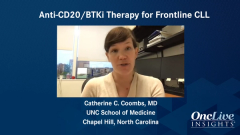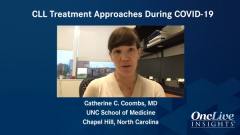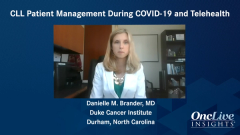
BTK Monotherapy for Frontline CLL
Episodes in this series

Alan P. Skarbnik, MD: BTK inhibitors change the paradigm of treatment for CLL [chronic lymphocytic leukemia]. Ibrutinib was approved in 2014 for CLL and actively changed the way we see the disease and how to treat the disease. Before that, the only options were chemoimmunotherapy and chemotherapy with an anti-CD21 antibody.
Since then, we had a second-generation BTK [Bruton tyrosine kinase] inhibitor approved for CLL as well, acalabrutinib. There are others on the way that should be approved in the next year or 2. Because ibrutinib was the first 1 to come to market, in terms of the novel agents, there is a broader uptake in the community. There’s a larger wealth of experience with this medication and certainly longer follow-up when compared with these other products that are now available in the market.
We have learned a lot of things by evaluating how patients tolerate the treatment and what kind of potential risks are associated with it. Not always what you see in the clinical trials, a more select population of patients, is necessarily what we see in the real-world evidence once we start using these drugs in clinical practice. Certainly, it was different for ibrutinib, which opened our eyes to several things.
BTK inhibitors, as a general class, do carry an increased risk of bruising and bleeding because of the interaction they have. It is not a contraindication if patients are using other antiplatelet medications for cardiac issues or if they are on anticoagulation. Certainly those patients need to be followed more closely because there is an increased risk of bleeding. Additionally, it can cause arthralgias as well because it can cause diarrhea. Ibrutinib particularly has a higher risk of atrial fibrillation and cardiac arrhythmias. Acalabrutinib has a higher risk of headaches, which are highly responsive to caffeine, for instance. But each of these medications has its own set of adverse effects and viscosity profile.
When choosing this treatment, we need to be mindful of what other diseases the patients have. What is their lifestyle? How may it impact your lifestyle? How old are they? We know that older patients, particularly older than 65, have a higher risk of intolerability with ibrutinib. This has been shown in a number of retrospective studies. Particularly the cardiac toxicity, including hypertension, is more prominent in older patients when compared with younger patients.
A patient who is 70 or 75 years old and may have hypertension at baseline, will raise certain concerns about using a BTK inhibitor for a longer period of time because that may worsen those baseline conditions. It also may increase their polypharmacy because they’re already on a multitude of medications. We don’t want to end up giving more medications and then have 2 other medications to treat hypertension or atrial fibrillation.
Not to say that all these are going to develop; that’s not the case. But we need to monitor that closely and we need to be aware of the risks associated with it. Besides that, older patients tend to not have the extent of commercial coverage, in terms of their medical insurance for medications, as younger patients in general. We need to take that into consideration as well because the out-of-pocket cost may be for a long period of time and may make the choice of a certain therapy impossible because a number of patients wouldn’t be able to afford it.
Acalabrutinib was recently approved based on the ELEVATE-TN trial that was published earlier this year. It is a second-generation BTK inhibitor. One of the main goals in developing the drug was to have a “cleaner drug” that was more specific to the BTK enzyme and had less off-target enzyme inhibition. We’ve hypothesized a number of the adverse effects seen on ibrutinib are secondary to the multitude of off-target enzymes that acalabrutinib inhibits.
The head-to-head trial between acalabrutinib and ibrutinib has no readout yet. It is the relapse setting for high-risk disease. The trial is not in the frontline setting, but that will give us more information comparing head to head the adverse-effect profile of these drugs. We don’t expect a significant difference in efficacy between those medications because their mechanisms of action are the same. They bind to the same cysteine residue and the BTK molecule with very similar affinity. However, a difference to therapy is important because the BTK enzyme recycles and regenerates on a very constant basis, by removing the inhibition it gives leeway to resistance progression of disease. Having a therapy that patients will veer more to is very important.
In my clinical experience, acalabrutinib should be better tolerated than ibrutinib. It’s a different adverse- effect profile. I’ve seen less intense arthralgia initially—which is an issue with ibrutinib—and less development of cardiac arrhythmias, atrial fibrillation, and high-grade hypertension in these patients. It is important to note that the follow-ups with these patients are shorter than with ibrutinib. Although most adverse effects did decrease over time, similar adverse effects, particularly hypertension with ibrutinib, increased over time. My particular clinical preference has been, in terms of BTK inhibitor usage, to use acalabrutinib over ibrutinib. In my experience, patients do tolerate that better. The only time I use ibrutinib instead of acalabrutinib is for patients who are on proton pump inhibitors [PPIs]. That’s a contraindication to use with acalabrutinib because that impairs the absorption of the drug. Patients who have peptic ulcer disease, who cannot transition from a PPI to an anti-H2, for instance, should not receive acalabrutinib. If I’m using a BTK inhibitor, those patients will use ibrutinib. But much of it is a personal preference. This has been my clinical practice, not to say that ibrutinib is not a great drug; it is. We just have some issues with tolerability.
Transcript Edited for Clarity




















































